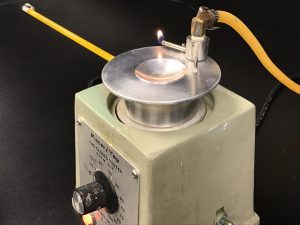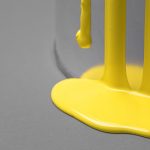NFPA 30, Brewing, Alcoholic Beverages, Flash Point and Sustained Combustion: Do You Need Explosion-Proof Equipment?
By: Katherine Hatherley, LABORATORY TECHNICAL SPECIALIST, email
The beverage industry’s flavor enhancement relies significantly on alcohol flavorings or alcohol essence flavors, commonly used in beverages like beer or spirits. Beyond their taste-altering properties, these flavorings may fall under the classification of flammable liquids or combustible liquids, prompting adherence to specific fire code occupational safety requirements for their storage areas, portable tanks, production area, and safety equipment like fire extinguishers. This extended discussion aims to provide a comprehensive understanding of the National Fire Protection Association (NFPA) guidelines, particularly NFPA 30, while highlighting the vital role of Dell Tech’s laboratory testing services in ensuring compliance with safety standards.
Understanding Flammable Liquids and Combustible Liquids
The National Fire Protection Association (NFPA) 30 Flammable and Combustible Liquids Code serves as a cornerstone for defining and categorizing combustible and flammable liquids based on their flash points. Flash point is the minimum temperature at which the vapors of a flammable liquid ignite from an open flame. This categorization is fundamental in determining the type of safe storage equipment necessary for storage areas and transportation of alcohol flavorings, ensuring both efficiency and safety.
Combustible Liquids
- Combustible Liquid Class II: Flash point ≥ 100°F (37.8°C) and < 140°F (60°C)
- Combustible Liquid Class IIIA: Flash point ≥ 140°F (60°C) and < 200°F (93°C)
- Combustible Liquid Class IIIB: Flash point ≥ 200°F
Flammable Liquids
- Flammable Liquid Class IA: Flash point < 73°F (22.8°C), boiling point < 100°F (37.8°C)
- Flammable Liquid Class IB: Flash point < 73°F (22.8°C), boiling point ≥ 100°F (37.8°C)
- Flammable Liquid Class IC: Flash point ≥ 73°F (22.8°C) and < 100°F (37.8°C)
NFPA 30 Equipment Requirements
To meet NFPA 30 standards, special equipment is mandatory for bulk safe storage or transportation/intermediate safe storage of flammable liquids or combustible liquids in storage areas. The material of the storage area container plays a crucial role, necessitating features such as emergency venting, pressure-actuated vents, and compliance with maximum allowable sizes based on the container’s material.
Explosion-Proof Equipment Exemption
An essential exemption to these storage area requirements exists for liquids with a flash point greater than 35°C (95°F) in a water-miscible solution or in dispersion with a water and inert (non-combustible) solids content of over 80 percent by weight. Liquids meeting these criteria do not sustain combustion during the “Method of Testing for Sustained Combustibility,” providing a critical exception detailed in NFPA Chapter 9 Storage of Liquids in Containers – General Requirements.
The L.2 Sustained Combustibility Test
A linchpin in determining the combustibility of substances is the L.2 Sustained Combustibility Test. This evaluation gauges whether a substance can sustain combustion under specific test conditions when exposed to a flame. Utilizing a combustibility tester with an aluminum alloy block and a sample well, the test involves heating to necessary temperatures. Technicians observe if the sample ignites and sustains combustion, noting the duration after removing the test flame.
Regulations Related to the L.2 Sustained Combustibility Test
Transportation of Dangerous Goods Requirements (US & Canada)
In adherence to the Transportation of Dangerous Goods Regulations, liquids with a flash point exceeding 35°C are not classified as Class 3 Flammable Liquids if they do not sustain combustion during the sustained combustibility test.
Consumer Chemicals & Containers Regulations (Canada)
Within the Consumer Chemicals & Containers Regulations in Canada, a combustible liquid (flash point > 37.8°C but < 60°C) may be exempt from classification if composed of 50% or more water and 50% or less water-miscible solvent, demonstrating no combustion sustainment during the L.2 Sustained Combustibility Test.
How Dell Tech Can Help
Dell Tech, an ISO 17025 accredited laboratory, emerges as a crucial ally for businesses navigating these complex safety standards. The laboratory offers comprehensive testing services, including assessments for flash point and the UN TDG L.2 Sustained Combustibility Test of flammable liquids. By engaging Dell Tech, businesses can confidently determine whether their products are exempt from NFPA 30 storage requirements, ensuring not only safety but also compliance with Transportation of Dangerous Goods and the Canadian Consumer Chemicals & Containers Regulations (CCCR). For businesses seeking a reliable partner in navigating safety standards, Dell Tech stands as a beacon of expertise and a testament to the commitment to safety in the beverage industry.
Conclusion
In conclusion, the incorporation of alcohol essence flavors in beverages brings not only a delightful sensory experience but also the responsibility of adhering to stringent safety standards for flammable liquids and combustible liquids. NFPA 30, with its clear categorizations and requirements, forms the backbone of health administration safety protocols for the safe storage and transportation of flammable liquids and combustible liquids. Dell Tech’s expertise in testing services becomes indispensable for businesses seeking to ensure compliance and safety in a complex regulatory landscape. By understanding and navigating these standards, the beverage industry can continue to innovate and thrive, balancing flavor creativity with the imperative of safety and compliance.
Dell Tech has provided professional, confidential consulting services to the specialty chemical
industry in Canada, the USA, Europe, and Asia for the last 40 years.







Your article on NFPA-30 guidelines for brewing equipment security is incredibly insightful. The way you wreck down the importance of appreciation flash points and sustained combustion in explosion-proof equipment is truly valuable. It presents clarity on a complicated topic, and your straightforward writing style makes it accessible to readers. Thank you for sharing this expertise and helping agencies navigate the safety issues in brewing alcoholic beverages. It’s an excellent resource for anyone in the brewing industry.